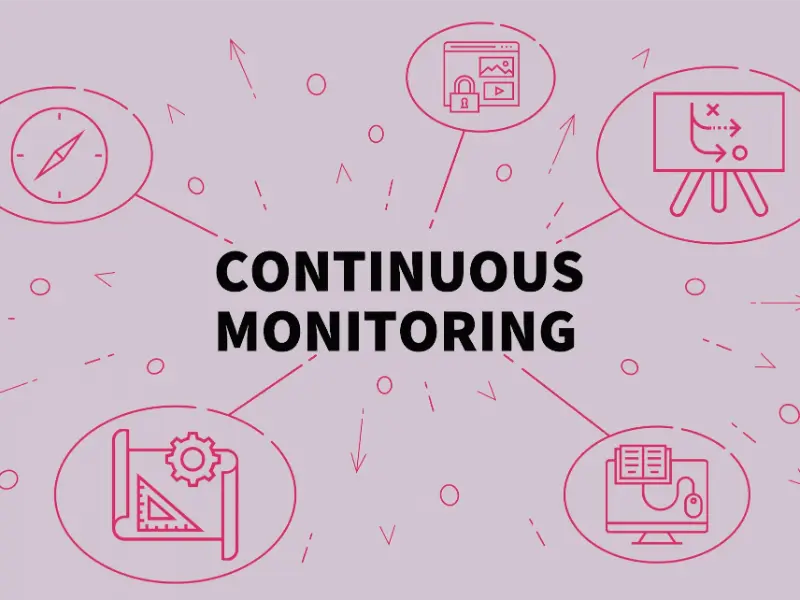- Compliance monitoring has become a vital component for organisations aiming to adhere to laws, regulations, and industry standards.
- This practice ensures that companies operate within the bounds of legal and ethical requirements, preventing violations that could lead to severe penalties, reputational damage, or operational setbacks.
Defining compliance monitoring
Compliance monitoring refers to the ongoing process of reviewing and auditing business activities to ensure they align with internal policies, external regulations, and contractual obligations. It involves setting up procedures and systems that regularly evaluate an organisation’s adherence to various legal frameworks and standards. This can span multiple sectors including financial services, healthcare, manufacturing, and more, with each having unique compliance requirements.
For example, a financial institution may need to adhere to anti-money laundering (AML) laws and data protection regulations like GDPR (General Data Protection Regulation), while a healthcare organisation must comply with patient privacy laws such as HIPAA (Health Insurance Portability and Accountability Act) in the United States or similar regulations elsewhere.
Also read: What is network monitoring and why is it important?
Key components of compliance monitoring
There are several critical components to an effective compliance monitoring programme:
Risk assessment: Identifying the areas where the business is most at risk for non-compliance is the first step in creating a monitoring system. This involves evaluating the types of regulations that apply to the company and pinpointing the areas where violations are most likely to occur. Risks could arise from changes in the law, internal processes, or external business conditions.
Policies and procedures: Establishing clear, comprehensive policies is essential for guiding employees and management in following compliance requirements. These should be easy to understand, regularly updated to reflect current regulations, and communicated effectively throughout the organisation.
Monitoring tools: Compliance monitoring tools and technologies are employed to track adherence to policies. Automated systems can streamline the monitoring process by constantly reviewing transactions, employee activities, and even communications for signs of non-compliance. These tools may include software for tracking data, alerts for suspicious activities, and dashboards to provide real-time insights.
Audits and inspections: Regular audits and inspections serve as essential checkpoints to assess whether compliance measures are being followed. These audits can be internal, conducted by the organisation’s own compliance team, or external, carried out by regulatory bodies. Inspections ensure that any gaps in compliance are quickly identified and corrected.
Training and education: One of the most critical aspects of compliance monitoring is ensuring that employees are well-informed. Regular training sessions help employees stay up-to-date on evolving regulations and compliance expectations. Additionally, fostering a culture of compliance within the organisation encourages employees to remain vigilant and proactive.
Reporting and documentation: Maintaining accurate records of compliance activities is crucial, particularly when regulatory bodies conduct investigations or require proof of adherence. Documentation also helps organisations track their compliance efforts and evaluate the effectiveness of their policies over time.
Also read: 6 essential types of network monitoring for robust security
Why is compliance monitoring important?
Compliance monitoring offers several significant benefits to organisations:
Avoidance of legal penalties: Failing to comply with regulations can lead to hefty fines, legal action, or even the revocation of business licences. By continuously monitoring compliance, organisations can quickly identify and address issues before they escalate.
Protecting reputation: Companies found to be in violation of laws often suffer reputational damage, which can harm customer trust and lead to a loss of business. A robust compliance programme shows stakeholders that the company prioritises legal and ethical practices.
Operational efficiency: Monitoring compliance helps prevent disruptions that could arise from regulatory violations. This allows businesses to focus on their core operations without having to deal with unexpected legal challenges or penalties.
Improved decision making: By using data-driven insights from compliance monitoring systems, organisations can make more informed decisions. These insights can highlight areas for improvement, enabling businesses to optimise their processes and reduce risks.
Employee accountability: Clear compliance monitoring creates a system of accountability within the organisation. When employees know they are being monitored and educated on compliance policies, they are more likely to adhere to these guidelines and contribute to a culture of compliance.
Challenges of compliance monitoring
While compliance monitoring is crucial, it does come with challenges. One of the primary difficulties lies in keeping up with ever-changing regulations, particularly in highly regulated industries like finance and healthcare. Additionally, the globalisation of business means that companies may need to comply with a complex web of international laws.
Moreover, the cost of setting up a comprehensive compliance monitoring system can be substantial, especially for smaller organisations. However, the long-term costs of non-compliance can far outweigh the initial investment in monitoring tools and systems.

